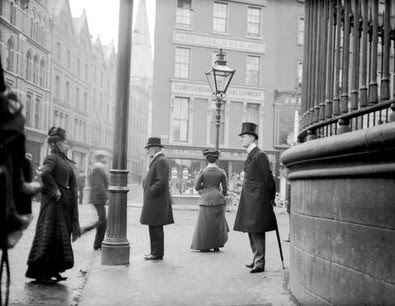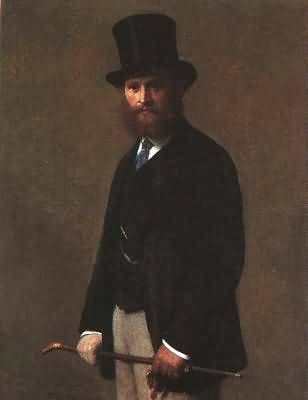The Flâneur
Robert Herbert, Impressionism and Naturalism
An important figure in 19th century French culture was the "flâneur." There is no exact equivalent for the term in English, but it represents a man who wandered about Paris observing the life of the city and, often, writing about it. The flâneur was generally a dandy, i.e. someone who prided himself on dressing in the highest fashion, and he kept a distance from the scenes around him. The poet Charles Baudelaire and the Impressionist Edouard Manet are often treated as an example of this type. Below is a description of the role by Robert Herbert and a few descriptions of the flâneur from the time.
The flâneur, the purposeful male stroller, was a principal performer in the theater of daily life in Paris in mid-century, if we judge by his importance in writings of the era. A journalist, writer, or illustrator, he looked about with the acute eye of a detective, sizing up persons and events with a clinical detachment as though natural events could tell him their own stories, without his interference. He was an ambulatory naturalist whose objectivity set the stage for Impressionism. Among the painters, only Manet, Degas, and Caillebotte could be counted among the flâneurs, but the other impressionists adopted the characteristic features of this modern Parisian: objectivity and a devotion to contemporary life.
we judge by his importance in writings of the era. A journalist, writer, or illustrator, he looked about with the acute eye of a detective, sizing up persons and events with a clinical detachment as though natural events could tell him their own stories, without his interference. He was an ambulatory naturalist whose objectivity set the stage for Impressionism. Among the painters, only Manet, Degas, and Caillebotte could be counted among the flâneurs, but the other impressionists adopted the characteristic features of this modern Parisian: objectivity and a devotion to contemporary life.
19th Century Descriptions of the Flaneur
The only, the true sovereign of Paris I will name for you: he is the flâneur.
A. Bazin, L'Epoque sans nom, esquisses de Paris 1830-1833, 1833
 That kind of man [the flâneur] is a mobile and passionate daguerreotype who retains the faintest traces of things, and in whom is reproduced, with their changing reflections, the flow of events, the city's movement, the multiple physiognomy of the public mind, the beliefs, antipathies, and admirations of the crowd.
That kind of man [the flâneur] is a mobile and passionate daguerreotype who retains the faintest traces of things, and in whom is reproduced, with their changing reflections, the flow of events, the city's movement, the multiple physiognomy of the public mind, the beliefs, antipathies, and admirations of the crowd.
Victor Fournel, Ce qu 'on voit dans les rues de Paris, 1858
. . . we like to pose, to make a spectacle of ourselves, to have a public, a gallery, witnesses to our life. So profit from this Parisian mania in order to enrich your album with sketches, your notebooks with remarks, and your cerebral portfolios with observations.
Alfred Delvau, Les plaisirs de Paris, 1867
Henri Fantin-Latour, Portrait of Edouard Manet (1867)
